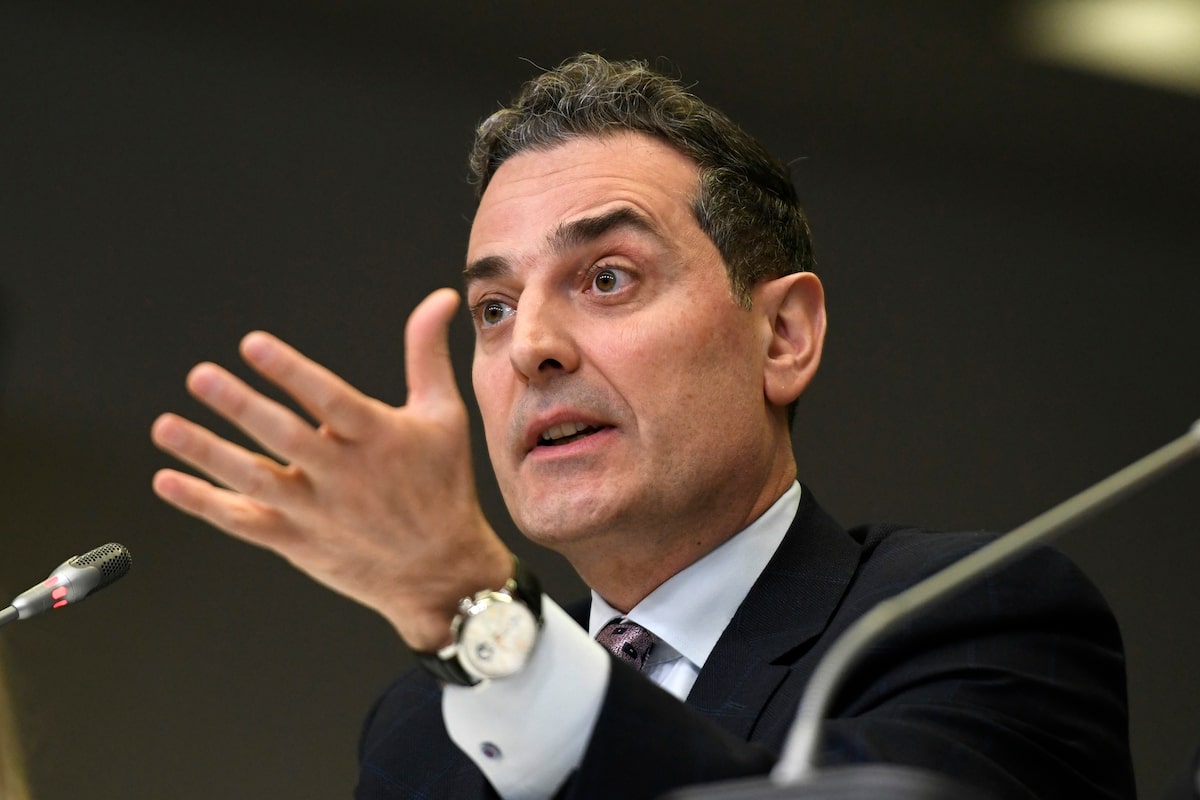News
BCE shares drop nearly 10% after paying $5-billion for U.S. internet provider Ziply and pausing dividend hikes

Mirko Bibic, president and CEO of BCE and Bell Canada, speaks throughout a CRTC listening to in Gatineau, Que., Feb. 19, 2020. Bibic stated in an interview that the Ziply acquisition reveals the corporate is on its ‘entrance foot.’Justin Tang/The Canadian Press
Bell Canada dad or mum BCE Inc. BCE-T is increasing into the USA by buying web supplier Ziply Fiber for $5-billion, whereas additionally placing dividend hikes on maintain to assist repair its stability sheet.
BCE traders despatched the corporate’s share worth tumbling practically 10 per cent on Monday in response to the information. The corporate’s shares, at $40.47 every, are buying and selling on the identical degree as in late 2011.
With the acquisition, introduced early Monday, Canada’s largest telecommunications firm will function in 4 U.S. states within the Pacific Northwest – Washington, Oregon, Montana and Idaho – and supply fibre web providers to 1.3 million residential and enterprise areas. BCE hopes to improve extra of Ziply’s copper wire community to quicker fibre over the subsequent 4 years, bringing its complete fibre connections to 3 million.
Credit standing company Moody’s endorsed the transaction, calling it “credit score constructive” and “strategically applicable.”
However the deal triggered vital response from some analysts, who questioned the corporate’s strategic shift in pausing dividend will increase and spending closely to accumulate an organization outdoors BCE’s present geographic footprint that would require vital capital expenditures within the coming years.
In a notice to shoppers on Monday, Financial institution of Nova Scotia analyst Maher Yaghi stated “traders in Canadian telecom are within the sector for dividends and never in it to get development; they will get it elsewhere,” including that “no dividend will increase within the foreseeable future represents an essential strategic change.”
In an analyst name Monday morning, Mr. Yaghi requested BCE chief govt officer Mirko Bibic, “Are you altering what BCE represents?”
“We’re leaning into our core enterprise, which is to generate development from fibre,” Mr. Bibic responded. “Fibre is a long-life infrastructure asset, and shareholders will profit for, frankly, for many years to return,” he added later.
BCE has lengthy been a well-liked title amongst traders in search of a excessive dividend yield, at present near 10 per cent. However the telco is spending round 140 per cent of its free money stream every year on dividends alone, and the corporate’s monetary state of affairs has been deteriorating due to a excessive debt load and slowing earnings development. Two debt score businesses downgraded BCE’s debt this summer season.
Many traders anticipated the corporate to make use of the proceeds of the deliberate sale of its stake in Maple Leaf Sports activities & Leisure (MLSE) to pay down debt.
As a substitute of doing so, BCE is utilizing $4.2-billion in proceeds from MLSE on the Ziply buy, and administration signalled the acquisition may very well be the beginning of a broader growth into the U.S.
Mr. Bibic stated in an interview the acquisition reveals the corporate is on its “entrance foot” in pursuing development, and is swapping its fairness funding in MLSE for working earnings with upside from Ziply. “This can be a nice commerce, in sports activities phrases,” Mr. Bibic stated.
The MLSE sale gave BCE choices, as a result of it “was both going to permit us to considerably cut back debt or seize the expansion agenda that we had in thoughts.”
As for the dividend, BCE stated Monday that it’s going to pause dividend development till its dividend payout and internet debt leverage ratios are “monitoring in direction of our goal coverage vary.”
As BCE expands within the U.S., it must navigate the aggressive nature of the U.S. broadband market.
Toronto Dominion Securities analyst Vince Valentini famous that the return on the deal would take a number of years.
“You simply took your debt down, now you’re taking it again up. I feel individuals might want to see one thing actually engaging right here to justify why you need to tackle extra debt so rapidly,” Mr. Valentini stated.
(BCE’s internet debt leverage ratio on the transaction’s shut is projected to stay comparatively unchanged at 3.7 instances adjusted earnings earlier than curiosity, taxes, depreciation, and amortization, based on the corporate. That features $2-billion of incremental Ziply internet debt that BCE will assume.)
Ziply is forecast to generate EBITDA in extra of $400-million in 2025, based on BCE.
However Mr. Bibic stated nearly all of Ziply’s footprint didn’t face main competitors or penetration of a kind of cheaper web providing referred to as fastened wi-fi entry which has been rising within the U.S. in recent times.
Except for technique, analysts additionally famous the reintroduction of a dividend reinvestment plan (DRIP) can be dilutive to current shareholders.
The DRIP will enable traders to reinvest their dividends in extra BCE shares from its treasury at a 2-per-cent low cost to the market. Whereas this may enable BCE to preserve money – about $1.2-billion yearly if 35 per cent of shareholders take part, based on a TD Securities estimate – it can additionally add to BCE’s share rely yearly.
-

 News4 weeks ago
News4 weeks agoHere’s the 2025 Houston Rodeo lineup – Houston Public Media
-

 News4 weeks ago
News4 weeks agoTrump takes office – NBC New York
-

 News4 weeks ago
News4 weeks agoCanadian school boards among those affected by cyber incident involving third party
-

 News4 weeks ago
News4 weeks agoVikings Open Big Sky Home Schedule Thursday Against Eastern Washington
-

 News4 weeks ago
News4 weeks agoZendaya, Should We Be Reading Into That Diamond on Your Ring Finger at the Golden Globes?
-

 News4 weeks ago
News4 weeks agoLos Angeles Mayor Karen Bass under fire for response to raging wildfires
-

 News4 weeks ago
News4 weeks agoBison Win 10th FCS National Championship 35-32 Over Montana State
-

 News3 weeks ago
News3 weeks agoPatrik Laine earns Molson Cup honor for December
